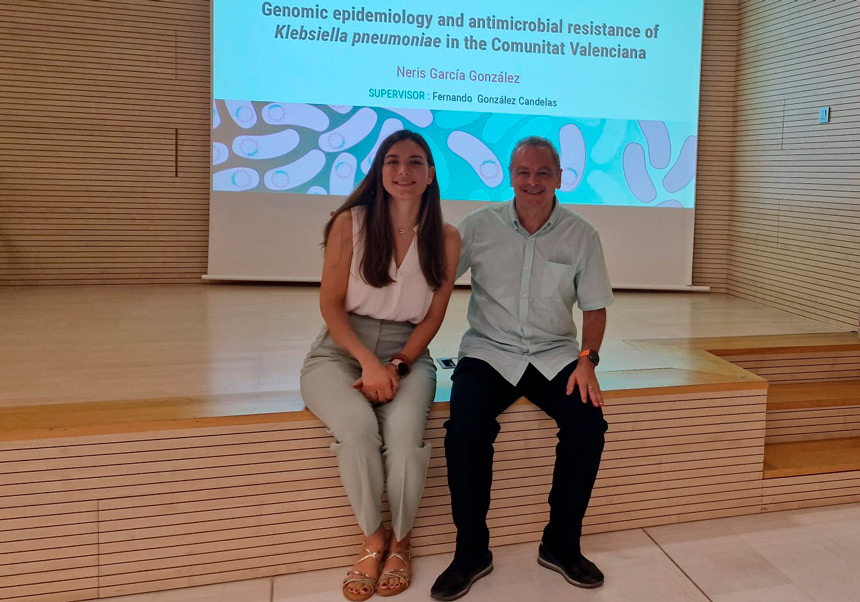Users
Social media
- More details here...
- Address
Parc Científic de la Universitat de València C/
Catedrático Agustín Escardino, 9
46980 Paterna (Valencia) Spain - Email:
iu.i2sysbio@uv.es - Phone:
(+34) 963544810
- Address
Links
Neris García González defends his thesis on the epidemiology of antimicrobial-resistant bacteria

Investigation & Education
Seminar
Neris García González defends his thesis on the epidemiology of antimicrobial-resistant bacteria

In this thesis, directed by Fernando González Candelas, studies the genomic epidemiology of Klebsiella pneumoniae resistant to antibiotics whose infections pose a great threat to public health. Part of the research results have been published in the journals Microbiology Spectrum and Microbial Genomics. The thesis was defended on July 18, 2023.
Antimicrobial resistance (AMR) is a major threat to public health. The misuse and abuse of antibiotics has led to the emergence and spread of antibiotic-resistant infections. A few pathogens are responsible for the majority of deaths caused by bacteria associated with ADRs and, among them, Klebsiella pneumoniae is one of the most worrying. This bacteria was the second cause of deaths attributed to AMR in 2019. Among the ADRs ofK. pneumoniaestrains that have acquired resistance to third-generation cephalosporins (C3G) and carbapenems (CRKp) are of most concern. In the thesis titled “Genomic epidemiology and antimicrobial resistance of Klebsiella pneumoniae in the Comunitat Valenciana” the epidemiology of K. pneumoniaeresistant to C3G and carbapenems with the information obtained in theK Surveillance project. pneumoniaein the Valencian Community (SKPCV). The study is based on a collection of 1,604 SKPCV genomes, 395 isolates collected from three hospitals in the CV and more than 10,000 genomes available in public databases. The analysis showed that one lineage, ST307, was responsible for the majority of resistant infections and inter-hospital transmissions. It was also seen that the AMR determinants and the corresponding carrier lineages had different distributions between hospitals and that, apart from ST307, most combinations between lineage and AMR determinant were restricted to one hospital. An initial appearance of carbapenem resistance and its dissemination at the Hospital General Universitari de València (HGUV) occurred in a short period of one year and was very complex. Six different lineages encompassed the majority of the HGUV CRKp population and disseminated various resistance mechanisms on different plasmids. These lineages underwent local clonal expansion, with several cases of possible direct transmission in the hospital itself. Finally, genomic epidemiology allowed us to describe the appearance and dissemination in several hospitals of a new blaNDM-23 carbapenemase gene. This gene is carried on a multidrug-resistant plasmid with 18 additional RAM genes, which produced a multidrug resistance phenotype. The gene and plasmid were in a strain ST437. The plasmid was not mobilizable, so blaNDM-23 spread by clonal expansion. The dissemination of this ST437 lineage carrying blaNDM-23 affected four different hospitals in the CV between 2016 and 2019, the year in which the sampling concluded.
Neris García González carried out his research in the Molecular Epidemiology group at I2SysBio under the supervision of Fernando González-Candelas, professor of genetics at the UV and researcher at Fisabio and the Institute of Integrative Systems Biology I2SysBio (UV-CSIC). During the development of the thesis, he completed a stay at the Microbial Evolution Laboratory, Pasteur Institute, Paris (France) and enjoyed a PIND contract from the UV associated with the projects BFU2014-58656-R and BFU2017-89594-R. The qualifying panel was made up of Iñaki Comas Espadas (Instituto de Biomedicina de València IBV, CSIC), Alvaro San Millán Cruz (National Center for Biotechnology, CSIC) and Natacha Monge Gomes do Couto (Big Data Institute, Oxford UK), who rated the thesis as outstanding.


